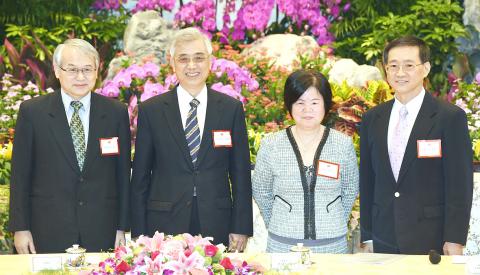President Ma Ying-jeou’s (馬英九) latest nominations for grand justices drew criticism yesterday, as Democratic Progressive Party (DPP) legislators and civic groups questioned not only his right to nominate candidates, but also whether a judge who acquitted him in a corruption case is an appropriate nominee.
“The tenures of grand justices and the president have been designed in such a way so as to avoid having one president recommend candidates for the Council of Grand Justices twice” during his or her term in office, Taiwan Jury Association chairman Cheng Wen-lung (鄭文龍) told a news conference in the legislature yesterday morning.
“After making all these nominations, the Council of Grand Justices would be Ma’s Council of Grand Justices, and we would have an authoritarian constitutional system,” Cheng said.

Photo: Wang Min-wei, Taipei Times
Based on the current system, seven of the 15 grand justices are to serve four years, while the other four would serve eight years to avoid having one president nominate all sitting grand justices, Cheng said.
The candidates have to be confirmed by the legislature.
“Due to the Chinese Nationalist Party’s (KMT) boycott of the four nominees made by the previous president, Ma was able to nominate 11 grand justices in 2008,” Cheng said. “If he nominates four more, all 15 of them would be Ma’s nominees.”
DPP Legislator Tien Chiu-chin (田秋堇) agreed, urging Ma to withdraw his nominations to allow the next president, who is to be elected next year, to do so.
“Otherwise, it would create chaos in society,” she said.
Citizens’ Congress Watch executive director Chang Hung-lin (張宏林) urged legislators to reject the four nominees: lawyer Huang Horng-shya (黃虹霞), Deputy Minister of Justice Wu Chen-huan (吳陳鐶), National Taiwan University law professor Tsai Ming-cheng (蔡明誠) and Shilin District Court President Lin Jyun-yi (林俊益).
Aside from the constitutional issue, DPP Legislator Huang Wei-cher (黃偉哲) questioned Ma’s choice of Lin, a former Supreme Court judge who acquitted Ma of corruption charges in connection with the use of his special allowance during his stint as Taipei mayor.
“It is obvious that Ma is trying to pay Lin back by nominating him as a grand justice,” Huang said.
In response to the criticism, Ma said that it is his constitutional obligation to nominate grand justices when the seats become vacant.
“The president or the legislature would be acting unconstitutionally if we fail to fulfill our constitutional duties,” he said.
Presidential Office spokesperson Charles Chen (陳以信) said the candidates have been recommended by a special review commission, and the president was merely making nominations accordingly.

Tropical Storm Gaemi strengthened into a typhoon at 2pm yesterday, and could make landfall in Yilan County tomorrow, the Central Weather Administration (CWA) said yesterday. The agency was scheduled to issue a sea warning at 11:30pm yesterday, and could issue a land warning later today. Gaemi was moving north-northwest at 4kph, carrying maximum sustained winds near its center of up to 118.8kph and gusts of 154.8kph. The circumference is forecast to reach eastern Taiwan tomorrow morning, with the center making landfall in Yilan County later that night before departing from the north coast, CWA weather forecaster Kuan Shin-ping (官欣平) said yesterday. Uncertainty remains and

SEA WARNING LIKELY: The storm, named Gaemi, could become a moderate typhoon on Wednesday or Thursday, with the Taipei City Government preparing for flooding A tropical depression east of the Philippines developed into a tropical storm named Gaemi at 2pm yesterday, and was moving toward eastern Taiwan, the Central Weather Administration (CWA) said. Gaemi could begin to affect Taiwan proper on Tuesday, lasting until Friday, and could develop into a moderate typhoon on Wednesday or Thursday, it said. A sea warning for Gaemi could be issued as early as Tuesday morning, it added. Gaemi, the third tropical storm in the Pacific Ocean this typhoon season, is projected to begin moving northwest today, and be closest to Taiwan on Wednesday or Thursday, the agency said. Today, there would likely

DISRUPTIONS: The high-speed rail is to operate as normal, while several airlines either canceled flights or announced early departures or late arrivals Schools and offices in 15 cities and counties are to be closed today due to Typhoon Gaemi, local governments announced last night. The 15 are: Taipei, New Taipei City, Taoyuan, Tainan, Keelung, Hsinchu and Kaohsiung, as well as Yilan, Hualien, Hsinchu, Miaoli, Chiayi, Pingtung, Penghu and Lienchiang counties. People should brace for torrential rainfall brought by the storm, with its center forecast to make landfall on the east coast between tonight and tomorrow morning, the Central Weather Administration (CWA) said. The agency issued a sea warning for the typhoon at 11:30pm on Monday, followed by a land warning at 11:30am yesterday. As of

CASUALTY: A 70-year-old woman was killed by a falling tree in Kaohsiung as the premier warned all government agencies to remain on high alert for the next 24 hours Schools and offices nationwide are to be closed for a second day today as Typhoon Gaemi crosses over the nation, bringing torrential rain and whipping winds. Gaemi was forecast to make landfall late last night. From Tuesday night, its outer band brought substantial rainfall and strong winds to the nation. As of 6:15pm last night, the typhoon’s center was 20km southeast of Hualien County, Central Weather Administration (CWA) data showed. It was moving at 19kph and had a radius of 250km. As of 3pm yesterday, one woman had died, while 58 people were injured, the Central Emergency Operation Center said. The 70-year-old